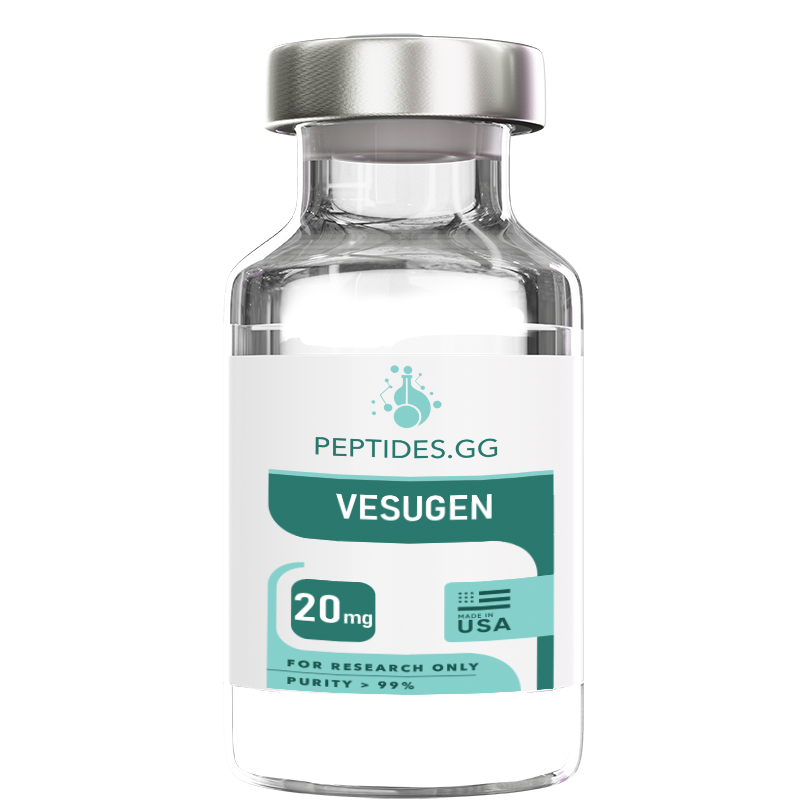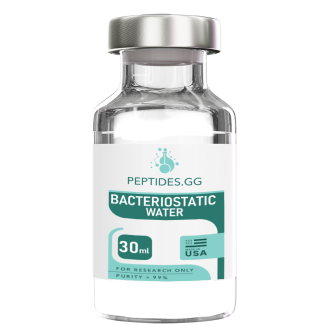Buy Vesugen (Bioregulator) peptide for research applications. High-purity Vesugen (Bioregulator) research peptide available for laboratory studies and scientific investigation. Shop premium quality research-grade peptides manufactured in the USA with comprehensive Certificate of Analysis documentation.
Important: All products are intended as research chemicals only for laboratory and in vitro testing and experimentation. All product information is educational and not to be taken as medical advice. No products are for human or animal use.
Vesugen (Bioregulator)
$60.00
- Free Delivery on all orders over $200
- Earn 5% Store Credit with Every Order
- Same Day Shipping Before 1 PM PST
- 10% Discount for Cryptocurrency Payments
14-day money-back guarantee
If you are not satisfied with the product, simply return it and we will refund your money

Buy Vesugen (Bioregulator) peptide for research applications. High-purity Vesugen (Bioregulator) research peptide available for laboratory studies and scientific investigation. Shop premium quality research-grade peptides manufactured in the USA with comprehensive Certificate of Analysis documentation.
Important: All products are intended as research chemicals only for laboratory and in vitro testing and experimentation. All product information is educational and not to be taken as medical advice. No products are for human or animal use.
Research Overview
Vesugen serves as a research tool for investigating vascular system-specific bioregulation and blood vessel tissue function in laboratory settings. This peptide bioregulator belongs to the class of organ-specific peptide preparations originally developed through research on tissue-specific regulatory mechanisms.
Vesugen research applications extend across multiple areas of vascular biology including endothelial cell function, vascular smooth muscle regulation, angiogenesis, vascular permeability, blood flow regulation, and vascular aging processes. Laboratory protocols examine these effects in cell culture systems, vessel explants, and preclinical animal models.
Molecular Characteristics
Complex Composition:
- Classification: Tissue-specific bioregulator peptide complex
- Source Material: Bovine vascular tissue (pharmaceutical grade)
- Molecular Weight Range: 1,000-10,000 Da (heterogeneous peptide mixture)
- Peptide Content: Multiple short-chain peptides (typically 2-20 amino acids)
- Form: White to off-white lyophilized powder
- Solubility: Water, phosphate buffered saline, cell culture media
Research Applications
Endothelial Cell Function Research
Vesugen serves as a research tool for investigating vascular endothelium:
- Endothelial Cell Viability: Investigation of EC survival, proliferation, and turnover
- Nitric Oxide Production: Research on eNOS expression, NO synthesis, and vasodilatory function
- Barrier Function Studies: Examination of endothelial permeability and tight junction regulation
- Adhesion Molecule Expression: Studies on VCAM-1, ICAM-1, E-selectin regulation
- Anti-Thrombotic Function: Investigation of prostacyclin production and coagulation regulation
Laboratory protocols employ endothelial cell cultures (HUVEC, HAEC, HMEC-1, EA.hy926) and endothelial function assays.
Vascular Smooth Muscle Research
Research applications extend to blood vessel wall cells:
- VSMC Proliferation: Investigation of smooth muscle cell growth and phenotype switching
- Contractility Studies: Research on calcium signaling, myosin light chain phosphorylation, contraction
- Receptor Expression: Examination of adrenergic, angiotensin, endothelin receptors
- Synthetic to Contractile Phenotype: Studies on smooth muscle differentiation and phenotype stability
- Migration and Remodeling: Investigation of VSMC migration and vascular remodeling processes
Experimental approaches include VSMC cultures (primary, A7r5, A10), contractility assays, and phenotype marker analysis.
Angiogenesis Research
Laboratory studies investigate Vesugen in blood vessel formation:
- Sprouting Angiogenesis: Research on endothelial cell sprouting from existing vessels
- Tube Formation Studies: Investigation of capillary-like network formation in 3D cultures
- Growth Factor Regulation: Examination of VEGF, FGF, angiopoietin expression and signaling
- Cell Migration Research: Studies on endothelial cell chemotaxis and invasion
- Maturation and Stabilization: Investigation of pericyte recruitment and vessel stabilization
Research protocols include tube formation assays, sprouting assays, Matrigel plug assays, and chorioallantoic membrane models.
Vascular Aging Research
Vesugen serves as a tool for investigating age-related vascular changes:
- Endothelial Senescence: Examination of aging markers in endothelial cells
- Arterial Stiffness: Research on elastin degradation, collagen accumulation, vessel compliance
- Endothelial Dysfunction: Studies on reduced NO bioavailability and impaired vasodilation
- Oxidative Stress: Investigation of ROS accumulation and antioxidant defense decline
- Telomere Dynamics: Analysis of telomere shortening in vascular cells
Research protocols employ aging models, senescence markers, and functional vascular assessment.
Vascular Inflammation Research
Laboratory studies examine Vesugen in inflammatory contexts:
- Cytokine-Induced Activation: Investigation of TNF-α, IL-1β, IL-6 effects on endothelium
- Adhesion Molecule Induction: Research on leukocyte adhesion molecule expression
- NF-κB Signaling: Examination of inflammatory transcription factor activation
- Leukocyte-Endothelial Interactions: Studies on immune cell rolling, adhesion, transmigration
- Anti-Inflammatory Mechanisms: Investigation of protective pathways and resolution
Experimental models include cytokine-stimulated cells, inflammatory stress conditions, and adhesion assays.
Cardiovascular Protection Research
Vesugen research applications include vascular protection:
- Oxidative Stress Protection: Investigation of antioxidant enzyme induction and ROS scavenging
- Ischemia-Reperfusion Studies: Research on hypoxia tolerance and reoxygenation injury
- Vasoprotective Pathways: Examination of protective signaling (Akt, ERK, eNOS)
- Mitochondrial Function: Studies on endothelial cell bioenergetics and mitochondrial health
- Apoptosis Resistance: Investigation of survival pathway activation and death resistance
Research approaches include oxidative stress models, hypoxia chambers, and cytoprotection assays.
Laboratory Handling and Storage Protocols
Lyophilized Powder Storage:
- Store at 2-8°C (refrigerated) in original sealed vial
- Protect from light and moisture
- Stable for 24 months refrigerated as unopened vial
Reconstitution Guidelines:
- Reconstitute with sterile water or appropriate buffer
- Add 1-2mL solvent per 10mg powder
- Gentle swirling motion recommended
- Final pH 6.5-7.5 for cell culture
Reconstituted Solution Storage:
- Short-term: 2-8°C for up to 7 days
- Long-term: -20°C in aliquots
- Avoid repeated freeze-thaw cycles
- Sterile filtration (0.22μm) for cell culture
Quality Assurance and Analytical Testing
Peptide Profile Analysis:
- HPLC peptide content verification
- Molecular weight distribution analysis
- Amino acid composition
- Peptide content determination
Purity Testing:
- Protein purity assay
- Endotoxin: <10 EU/mg
- Sterility testing
- Water content: <8%
Source Material:
- Pharmaceutical-grade bovine vascular tissue
- TSE/BSE compliance
- Standardized extraction protocols
Research Considerations
Experimental Design:
1. Concentration: 0.1-10 μg/mL in cell culture
2. Duration: 24-72 hours for gene expression studies
3. Cell Type Specificity: Verify vascular selectivity
4. Flow Conditions: Consider static vs. flow culture for endothelial cells
5. Complex Mixture: Account for multiple potential active components
Control Groups:
- Vehicle control
- Non-specific peptide control
- Positive controls (VEGF, FGF, shear stress)
- Tissue-specific comparisons
Mechanism Investigation:
- eNOS/NO pathway regulation
- VEGF receptor signaling
- Akt/ERK survival pathways
- Rho/ROCK contractility pathways
- Transcription factor modulation (KLF2, NRF2)
Compliance and Safety Information
Regulatory Status:
For in-vitro research and preclinical studies only. Not approved for human therapeutic use, dietary supplementation, or medical applications.
Intended Use:
- In-vitro cell culture research
- Vascular tissue explant studies
- In-vivo preclinical research
- Academic and institutional research
NOT Intended For:
- Human consumption
- Therapeutic treatment
- Dietary supplementation
- Veterinary applications without oversight
- Medical/clinical applications
—
 25% OFF $400+ • 35% OFF $800+ ALL WEEKEND
25% OFF $400+ • 35% OFF $800+ ALL WEEKEND 


